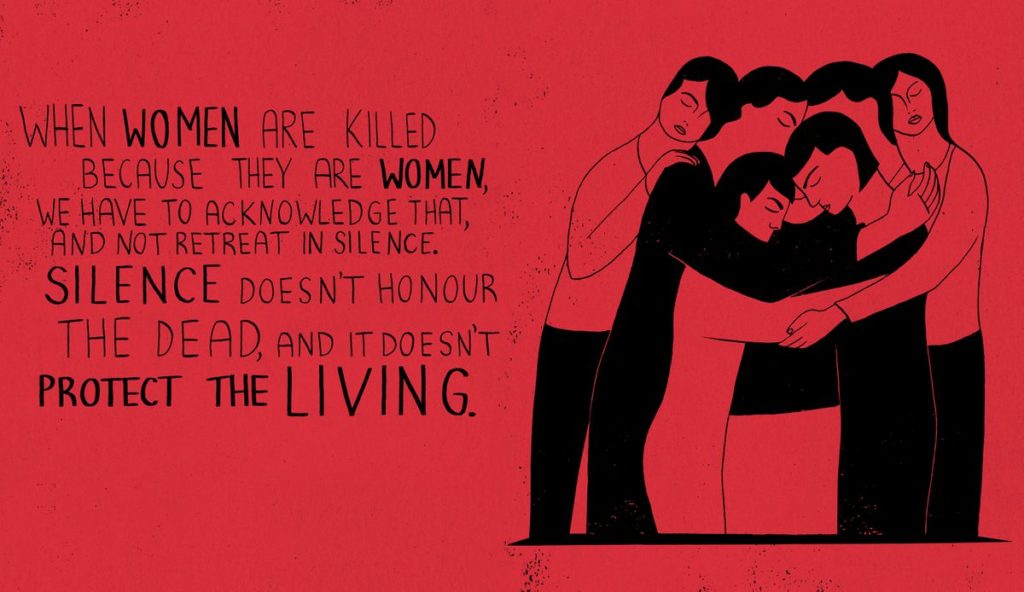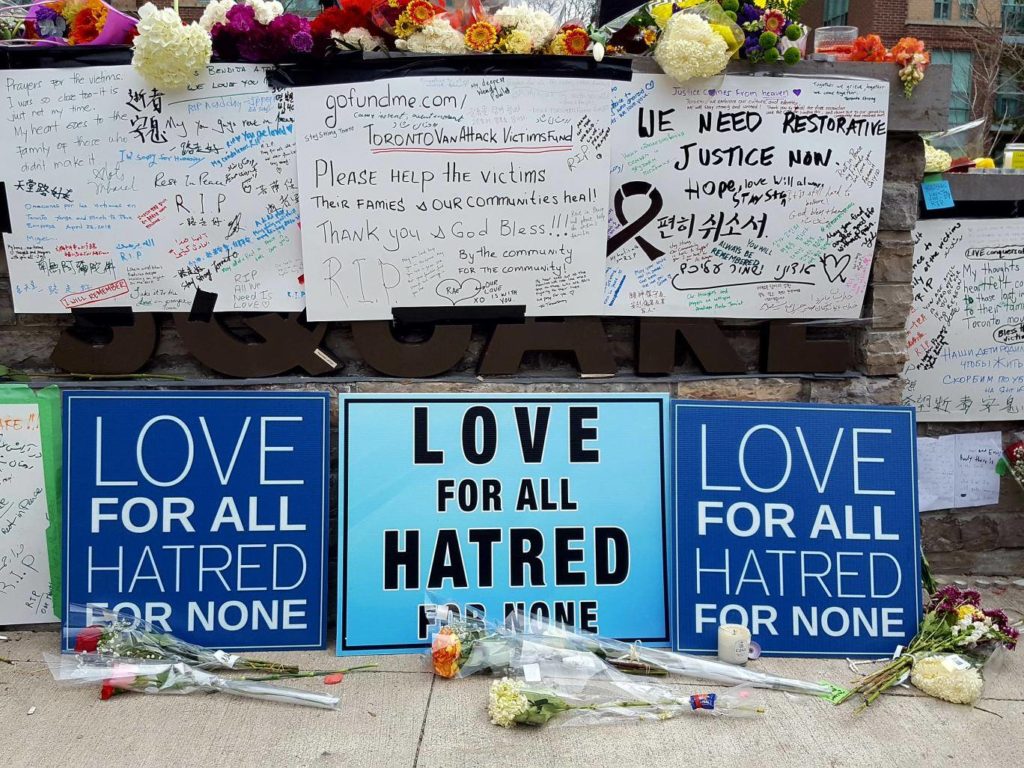It’s been 31 years since the Montreal Massacre at École Polytechnique in 1989 when 14 women were killed at the school. The shooter yelled: “I hate feminists!” before he began shooting.
In 2014, six people were shot and killed on a California university campus by a member of the “incel” community. His anger directed at women for not dating him.
In October 2015 a man in Oregon shot and killed nine people and eight others wounded, referred to himself as an “incel”.
November 2018, a 40-year-old self-proclaimed misogynist shot six women, killing two of them, at a Tallahassee yoga studio.
On April 23, 2018, 10 people were killed and 16 others were injured in a van attack in Toronto. Police confirmed that most of the victims were women. As news developments came in about the man driving a van into groups of pedestrians, we learned that it was targeted gender-based violence.
On June 3, 2019, a man stabbed a woman in the neck and then attempted to stab her 8-month-old child sitting in a stroller. He told police he was a member of the incel movement.
In February 2020, a 17-year-old man stabbed two women in their Toronto workplaces, killing one. Now, that attack has led to a historic first: On May 19, the RCMP and Toronto Public Service announced that the murder and attempted murder charges would be regarded as “terrorist activity” incited by the “incel movement”.
April 2020, after restraining and physically assaulting his partner the man went on to kill 22 people, 13 of the victims were women. This is now the deadliest shooting in Canadian history.
People often dismiss misogyny as a motivation for killing sprees because the devaluation of women has been so normalized historically that misogyny isn’t even considered as a factor for hate crimes, which is to say it doesn’t exist. Three of the worst mass killings in Canadian history sprang out of misogyny.
The men who are mass killers are looked at as individuals rather than the product of the larger social issue of misogyny. Instead, the focus becomes their mental health, their childhood, their education, and/or if they were bullied.
But misogyny kills us, through intimate partner homicide, or murder of women who do not comply with the demands of men, sexual or otherwise. Hatred of women is not a mental health issue; it’s a fatal social problem.
“Incels”
“Involuntary Celibate” or “incel” was invented in the early 1990s by a Toronto woman as a way to define a certain type of loneliness and connect with others who were facing the same type of loneliness. It has now turned into an online community entrenched with misogyny specific for boys and men who feel socially excluded and incapable to find love, sex or intimacy that they feel they are entitled to.
Incel is a sub-group of men’s rights activists, the movement of men based on the delusion of oppression, that somehow when women gain any sort of equity men are being oppressed. Incel forums online exist to normalize the resentment and violence, men encouraging each other to be misogynists and violent, and recognize those who make commitments to be violent to women as heroes.
Recently, the incel community has begun to express itself in the form of mass murder. Online platforms have long been more concerned with free speech than the literal lives of women, and the vicious, lethal misogyny of incels has flourished in these spaces accordingly. In 2014, the incel community encouraged Elliot Roger who shot and killed six University of California, Santa Barbara students, and injured fourteen others.
It’s More than Sex
In 2013, I wrote about male sexual entitlement and consent following the Steubenville, Ohio case of several young men sexually assaulted a young woman and shared it through social media. There is definitely a culture of sexual entitlement for boys and men, which is the belief that “men are owed sex on account of their maleness”. This revolves around the notion that girls and women’s bodies are objects that exist and be readily be available for male pleasure.
It is imperative we go beyond looking at this as “sexual frustration” as quoted in news articles. Men who perceive women as existing for their pleasure and conduct themselves as if they are entitled to sex choose to be violent to women as a form of power and control.
Some women have gained more agency over their sexual lives, and have pushed back against harassment, rape, and the objectification and dehumanization that often come with being a woman, and some men hate this. White heterosexual men feel threatened by some women’s increase in agency which threatens their sense power when it comes to dictating sexual and intimate experiences with women. They want to maintain control and use violence to make girls and women afraid.
Given that there was a mass murder in 1989 in Canada and now again with the van attack in Toronto, is this something we can expect more of?
According to a recent report, there have been at least 57 women have been killed in Canada so far in 2018, all caused by misogyny.
Misogyny from Patriarchy
We must look at violence against women through an intersectional lens. Indigenous women in Canada are estimated to experience 2.5 times the violence than other women which Amnesty International called a “human rights crisis”. Indigenous women not only face violence more frequently but the violence against them is also much more severe. There at least 1,200 murdered and missing Indigenous women in Canada.
Immigrant and racialized women face particular challenges in reporting violence due to language barriers and racial prejudices.
Also, for those who do not conform to sexual and gender binaries, such as, lesbians, bisexuals, genderqueer and trans people, violence is also multiplied because of patriarchy.
We need to hear more men speak out against patriarchy that not only affects women but also men. Let’s not forget that there is also a significant correlation between men who are abusive to their intimate partners and who are also responsible for mass murders.
 ILLUSTRATION BY HANNA BARCZYK
ILLUSTRATION BY HANNA BARCZYK
“Male violence comes with various stories and names, but it has one underlining patriarchal belief system. We need to hold each other accountable so we can be better human beings. The majority of men’s groups exclude feminist teachings. The men’s rights movement is gateway indoctrination to incels and so it’s important for men to talk to other men about pro-feminism and how we all can benefit. This is proactive work to prevent male violence against women”. –Irwin O.
“There also needs to be a systematic effort at deradicalizing those who are already indoctrinated. Law enforcement and governments have programs aimed at countering other forms of emerging extremism. Incels and other radicalized misogynists should also be targeted. But most importantly, we need to address the toxic masculinity that lies at the heart of their hatred”.-Arshy
“Men’s entitlement to women’s bodies is still very much a big problem. It’s a deeply embedded insidious idea that is taught to young boys and teenagers their whole adolescence through media and pornography. It’s built deeply in the structure and foundation of most of our economy and political system – within church and state, within marriage and law, within the workplace, the home, in sports, on campus, in education – the idea of private property came out of men’s accumulation of power within the family and the home and the assertion that women are men’s property”. -Ryan A.
What Next?
It would be nice to say that incels are an isolated issue, but they are not.
The vast majority of violent offenses are perpetrated by a man who the woman already knew rather than a stranger. But why is there so much public focus on violence when it’s done by a stranger?
We cannot, any longer, ignore misogyny, whether it is online, harassment, sexual violence, or violence in intimate partner relationships –because it has deadly consequences.
Battered Women’s Support Services (BWSS) exists to disrupt misogyny and other forms of inequalities. Supporting women on the front line through crisis support, counselling, support groups, legal advocacy but also working for systemic and social change and violence prevention. Because, every day, women experience violence, it’s just not always in the news. Every year, BWSS responds to over 11,000 requests for services.
It’s time for more people to join the movement. Respect and equity need to be a priority and must be integrated into every part of our culture.
 Rona Amiri is the Violence Prevention Coordinator at Battered Women’s Support Services and brings her passion for women’s liberation and ending violence to the community in her work with youth. Since 2012 she has she worked with thousands of youth in Metro Vancouver on topics related to the prevention of gender based violence including, sexual violence, dating violence, and online gender violence.
Rona Amiri is the Violence Prevention Coordinator at Battered Women’s Support Services and brings her passion for women’s liberation and ending violence to the community in her work with youth. Since 2012 she has she worked with thousands of youth in Metro Vancouver on topics related to the prevention of gender based violence including, sexual violence, dating violence, and online gender violence.





